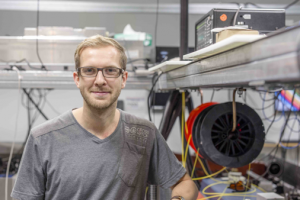Postdoc Talk Event: 6 October 2015 (7 PM), at the Railway Club
(all welcome, more details)
Postdoc Talk Title:
Lost in the woods: Discovering TRIUMF
Summary:
Nestled in the forest, swaddled by a blanket of Pacific Northwest woodland, just south of the UBC campus, may not be where you would expect to find particles being accelerated up to 75% the speed of light! This forested area is home to TRIUMF, Canada’s national centre for particle and nuclear physics and accelerator-based science.
An international hub for scientific exploration and discovery, at the heart of TRIUMF is its cyclotron accelerator, a machine that propels protons up to incredible speeds. Not just a few protons either – TRIUMF accelerates trillions of these particles per second. And the laboratory has been doing this for nearly 50 years!
But why? Accelerating protons is one thing, but by providing a facility to use high energy protons to investigate and benefit the world around us is where TRIUMF comes into its own. In his talk Dr. Thomas Procter, a postdoctoral researcher in TRIUMF’s Laser Spectroscopy Group, will share how TRIUMF, with the help of electricity and giant magnets, accelerates protons and what it uses these speedy particles for: like exploring the reactions that power the stars, testing electronics, treating cancer, and developing tracers for medical scans. And, if he remembers, he’ll talk about how he uses lasers to measure properties of rare elements that can only be produced with accelerators like the ones at TRIUMF…
Biography:
Dr. Thomas Procter received his PhD from the University of Manchester in 2013, working on experiments performed at the ISOLDE facility at CERN, Switzerland. At CERN, he worked on developing a new experimental setup for extending the sensitivity of nuclear physics experiments whilst also looking into how nuclei (the tiny things inside atoms) change size and shape when neutrons are added or taken away. Thomas continues this type of research at TRIUMF, where he is a nuclear physics postdoctoral fellow in the Laser Spectroscopy Group, working on new techniques for improving sensitivity and looking at different elements to see how protons and neutrons can affect how a nucleus behaves.
